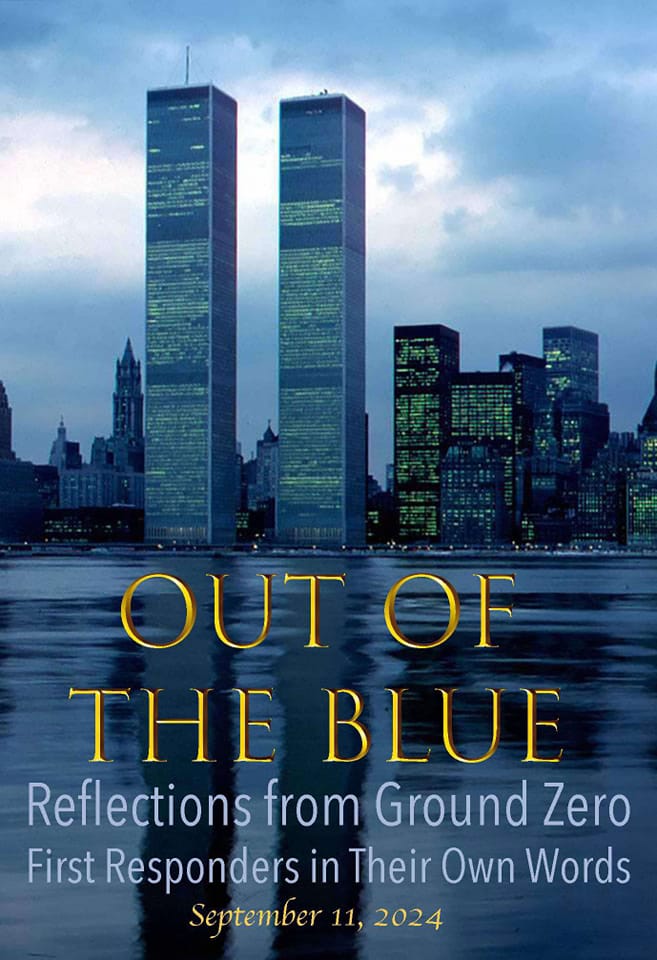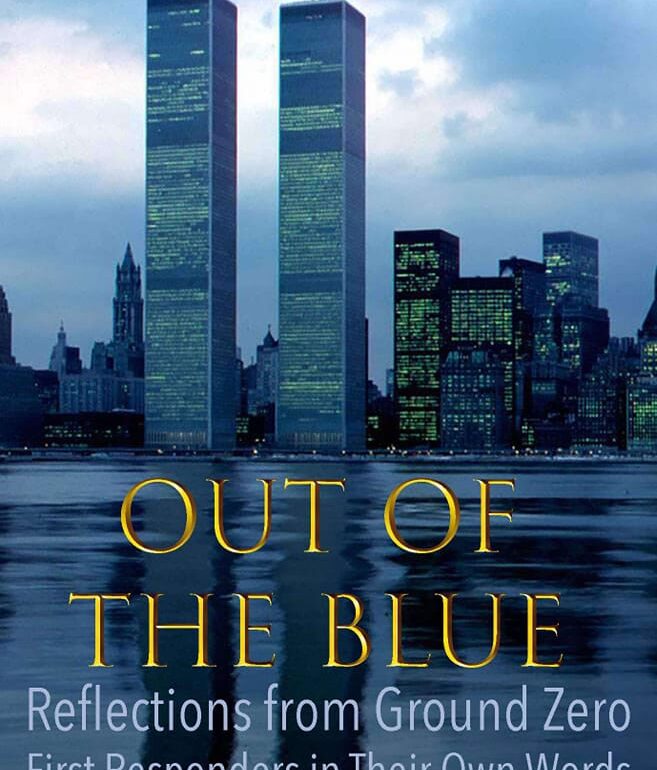author: Chris Pence
Where Were You when The World Stopped Turning: Out of The Blue at Laurel Mill Players
“September 11th, 2001, revealed heroism in ordinary people who might have gone through their lives never called upon to demonstrate the extent of their courage.”
– Geraldine Brooks
Everyone remembers where they were on that blue cloudless day in September when the Twin Towers fell, and 2,977 people lost their lives. Of those, 413 were first responders, including 343 firefighters, 60 police officers and 13 medical professionals. Writer/Director Lorraine Brooks was a new auxiliary police officer with little more than a badge on the morning of the attacks, who was called to direct traffic as civilians fled the city fearing for their lives and the future of the American Dream. As a student of workplace safety, Brooks wrote her Master’s Thesis, Out of the Blue: Reflections from Ground Zero on the firsthand experiences of the First Responders who bared witness to the attacks, and who helped to pull America out of the ashes on that fateful day. Laurel Mill Playhouse presented a single-night staged reading of Brooks’ work on the twenty-third anniversary of the day that would change everything.

While not yet a published play, Out of the Blue needs not a single change to format or performance in order to become one of the most successful pieces of American theatre in history. Brooks started the evening with an introduction of herself and her experiences of September 11th, explaining that she had interviewed several First Responders, and that all the stories discussed that evening were coming right from the source, with no exaggeration or hyperbole. The actors then entered and took their places, reading from nondescript white binders. The actors made little effort to costume themselves besides matching 9/11 remembrance pins and t-shirts proclaiming “9/11: We Will Never Forget.” The stage was set with just a handful of mismatched chairs, making no effort to present commonality or uniformity. Through these choices, the audience knew that the people who responded that morning were not superheroes, idols, or gods, but normal, average human beings who had been called into extraordinary circumstances, as well we may all be someday.
As the stories began, the audience began to feel like they were witnessing a meeting of a support group for survivors of the attacks. With assistance from Jacqueline Youm’s narration, the ensemble began to weave together the stories that most Americans would never think they’d hear, interspersed experiences from all sides of town. The audience began to visualize the attacks, reliving their own experiences of that morning through Youm’s narration and firsthand accounts that all echoed the confusion surrounding the first plane crash. The dialogue followed First Responders through their initial reporting to headquarters, what they saw in the streets surrounding the World Trade Center, street-level views of the first and second plan crashes, in the empty emergency rooms, and through the aftermath, searching through the rubble for the victims.
Reading the recollections of Anita Ryan, NYPD Sergeant R. Anne Hull detailed the helplessness and chaos that plagued the first responders when the initial reports came in. This was an unprecedented moment in American history, one that the First Responders quickly realized that no human could have truly helped. The numbers of officers were nothing compared to the scale of the attack, and their struggles with fear and misunderstanding mirrored everyone in the world as they watched the attacks in real time.
As NYPD Lieutenant Daniel Carione, Gene Valendo pulled no punches, presenting with unflinching detail Carione’s experiences. Crying and shaking, Valendo recalled the sight of people falling from the Towers and seeing victims’ body parts, reeling in disbelief. Once the second tower fell, Carione felt a strange sense of relief, because the victims’ suffering was finally over. He was now at peace with dying because he’d been there to sift through the debris of the deadliest attack on American soil. Valendo’s performance reached a mind shattering climax when he recalled Carione experiencing a man screaming in an emergency room that he’d seen faces through the windows of the second plane as the plane crashed into the Twin Towers. “Did they see me,” he shrieked, “Why did God make me see that?” Through Valendo, the audience saw it all through nonstop tears.
Leena Shrivastava Dev spoke of the confounded medical professionals on the day of the attacks. Through the eyes of Danny Lugassy (a first-year med student and former EMT), and Tucker Woods, (an Emergency Room physician), Dev described the bewilderment of Emergency Room staff as they saw the attacks and readied themselves for a surge of patients that would never come. While the first wave of ER patients had little more than bumps and bruises, those in critical condition would never make it to the hospital. Hospitals realized to their great horror that victims would either get out with minor injuries or would perish in the attacks.
Vinny Forras, a New York State Volunteer Firefighter (Steven Todd Smith), recounted the aftermath of the attacks, searching through the wreckage for victims. His strength and courage began to wane in the days after the attacks, between the respiratory and health issues he faced, and the emotional toll that it took. It was shortly after that he found the hand of a female victim, wearing a wedding ring. It was this moment that he resolved to stay and help, knowing “You brought this person home.” So many years later, Forras declares that “I’m still there,” and that he’d be there again without a question, despite losing his Workers Compensation two years just after the attacks, and his ongoing breathing troubles. He recalled a moment of shock when, for the first time, a civilian offered him a “thank you,” telling him that “it would be my honor to buy you breakfast.”
Laura Malkus, as Medical Examiner Charles Catanese, described with horrid detail the identification process when the First Responders found full or even partial remains. The First Responders would have funerals immediately in the morgue or onsite when they found one of their own. Catanese mourned that, while there would be many people who could be identified, infinitely more would never be found, their remains destroyed as the buildings collapsed.
Eren Gibson (Dionne Belk), was a Red Cross and ASPCA Volunteer who was also present during the cleanup. Belk’s performance showed that humans weren’t the only ones suffering during the fiasco. Rescue dogs who had been assigned to search for bodies began to become depressed, as they could smell only blood and death. Belk also opened the audience’s eyes to the fact that, while the Red Cross was taking thousands of blood donations, they were unneeded, as most of the victims of the attack would never survive the towers’ fall.
Joseph Fox (John Cholod), NYPD Chief, declared that he eventually stopped going to the hundreds of funerals following the attacks. ”It became too real,” he claimed, as he began to realize that these were not just names, but victims, whose friends and family would be left forever with little more than memories and trinkets recovered from Ground Zero.
Bianca Bob (Aparna Sri), a Salvation Army volunteer, gave some insight into the civilian efforts to aid First Responders in their rescue efforts. Sri offered a sliver of humor and hope, as civilians started to show support for First Responders. Bob presented dirty jokes and entertainment for those working at Ground Zero. She also sang the praises of the unsung heroes at Ground Zero, like the grandmother who parked her van at Ground Zero and cooked for the workers for 3 months after the attacks. She discussed how important the smallest actions are in the grand scheme of things, and her struggle not to cry, in an effort to be strong in front of civilians. Walking away from the wreckage, Bob laments,” Have we learned from this? Or is this just a different day, a different plane?”
As the reading came to a close, the Narrator reminded that audience that, while this was an act of terror, designed to tear America apart, it had the exact opposite effect. Americans began to come together, and, for those few months after, united as one to mourn, to support each other, and to celebrate that which makes us all so grateful to be Americans. The actors each stood and introduced themselves, announcing the names of the First Responders for whom they had read, and revealing that each actor had been carrying photographs of each of their First Responders throughout the reading. The cast then opened the floor for a Question-and-Answer segment, during which Brooks stated that each of the people interviewed for her work had survived, and were thankful for the opportunity to be represented so long after the attacks. Most of the cast had friends and family at Ground Zero, including Valendo, whose brother was one of the First Responders at the Towers. The audience shared their own stories about the horrific day and its aftereffects. The owner of Laurel Mills Playhouse also chimed in, telling the audience that the playhouse had been purchased and renovated shortly after the September 11th attacks, with the goal of bringing stories and events such as this to the Laurel area. This performance, he declared, was a dream two decades in the making, and he was proud to be presenting it.
There was only one detail that stood out with this performance, the fact that it has not yet been published as a stage play. As an honored guest of the premiere audience, I must make this plea: Lorraine Brooks, this performance was lifechanging, and these stories need to be told worldwide. No documentary or recollection of the events of September 11th, 2001, has ever touched an audience the way you did, and you deserve the utmost respect and praise for this poignant, uncensored portrayal of what really happened on that day. Please, for everyone who ever fought back tears remembering where they were on that day, publish this, so it can be shared through the ages. And when you win the Tony for Best Play, be sure to remember your favorite reviewer ????.
Heart-wrenchingly authentic, Lorraine Brooks’ Out of the Blue: Reflections From Ground Zero is an experience that no audience will ever forget. Here’s to the thousands who died, and the millions more who lived to tell their stories. We will never forget. To quote Alan Jackson, “[…]I know Jesus and I talk to God, and I remember this from when I was young, faith, hope, and love are some good things He gave us, and the greatest is love.”
For more information about current and upcoming performances at Laurel Mill Playhouse, please visit https://laurelmillplayhouse.org.

